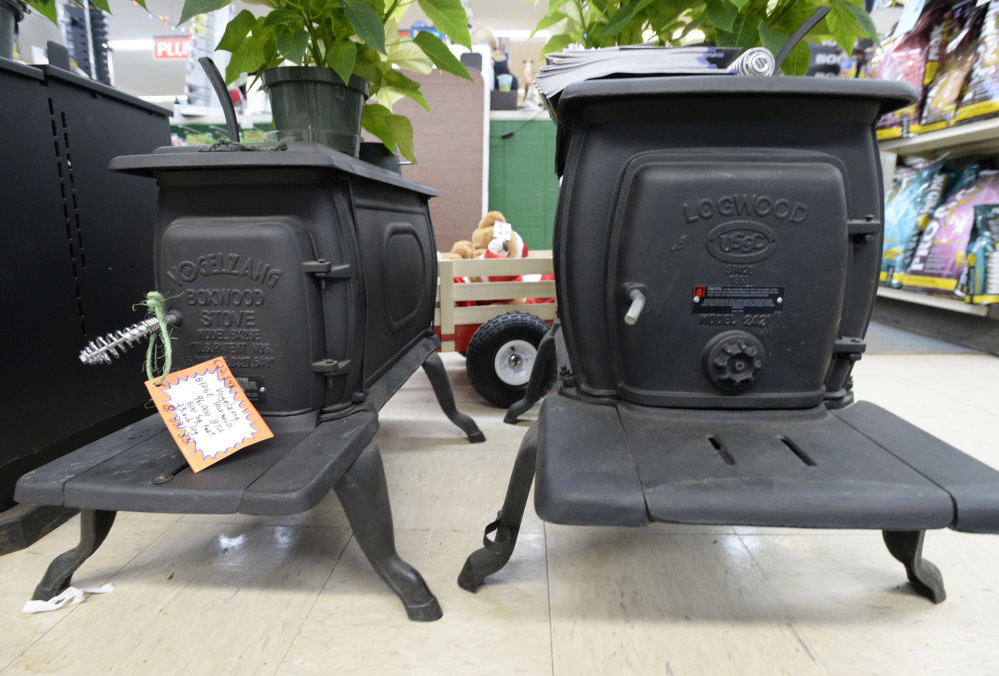JAY — There’s a nice selection of wood and pellet stoves displayed at the entrance to Paris Farmers Union here, including two small, cast-iron models. One is a Logwood camp-style stove; the other is a Vogelzang box heater. Both have labels that bear this inscription: “EPA Exempt.”
As of Jan. 1, neither can be legally sold by retailers in the United States.
For decades, many Mainers have bought stoves that were exempt from Environmental Protection Agency air quality rules. They were an affordable and reliable way to stay warm, especially in rural areas where firewood is easy to come by. Those days are ending now, to both laments and cheers.
“These stoves have been popular in all of Maine,” said Fred Rolfe, vice president for retail sales at Paris Farmers Union, which has 10 stores in Maine, New Hampshire and Vermont. “We’ve been selling these box-type stoves for 30 years. There are thousands and thousands of them out there.”
But new federal regulations ban stores from selling these and other stoves that don’t meet any emission standards, because they can emit up to 10 times as much smoke and lung-damaging particles as EPA-certified models. The Logwood and Vogelzang, which have sold in the $300 range, are the only two left at the Jay store.
That’s fine with John Ackerly, president of the Alliance for Green Heat in Takoma Park, Maryland. His group advocates for clean-burning wood heat.
“Tens of thousands of EPA-exempt stoves were sold year after year over the past 30 years and many models were far more popular than EPA-certified models,” he said. “They likely made up 23 to 35 percent of the market. The only state to recognize and act on this was Washington state, which banned their installation in 1995.”
DISCOUNTS AND PHASE-OUT
Until this year, EPA-exempt stoves were common at stores such as Paris Farmers Union and Tractor Supply Co. and at big-box retailers. They often sold for hundreds of dollars less than government-certified models found at stove shops. But manufacturers have been phasing them out and retailers began discounting them to move remaining stock.
As of Jan. 1, only stoves that meet EPA emissions rules of 4.5 grams-per-hour of particle matter can be sold in stores. The rules don’t apply to homeowners, who can resell any stove to anyone.
The rules also will have no impact on most stove shops, which don’t carry EPA-exempt stoves. The stoves most of them sell, from makers such as Jotul, Vermont Castings, Hearthstone and Hampton, already meet or exceed the new standards.
Consumers won’t notice much change until 2020, when the second step of the EPA rules is due to kick in. New stoves then will have to meet a 2 grams-per-hour particle limit. Many pellet stoves already meet that standard, but some cordwood stove makers complain that the rule will make stoves too expensive and add to maintenance and operation problems. The trade group that represents stove makers has filed a lawsuit to block the 2020 rule.
‘WE STILL GET A LOT OF CALLS’
At the Paris Farmers Union in Jay, a one-page information sheet stacked by the stoves explains the rules. Scott Deane, the store’s manager, said most customers aren’t familiar with the changes. Some are still looking for the Ashley BEC95, a big circulation heater priced at $749. It was among the most popular sellers, but was EPA-exempt.
“We still get a lot of calls for those,” he said.
Deane is displaying a Wonderluxe B2350 circulation heater, which is similar to the Ashley. It replaces a best-selling model called the Wonderwood B2941. The new model isn’t certified by the EPA, but it burns both wood and coal. After Jan. 1, retailers can only advertise it as a coal burner. That distinction will keep the model in stores, because coal isn’t covered by the new EPA rules.
Low oil prices have dampened wood stove sales. But Rolfe said the struggling economy in rural Maine suggests people with older stoves will keep them operating as long as they can.
Regulations aside, one market trend may slowly help phase out some of the least-efficient burners. Many customers are buying pellet stoves, which cut down on fuel handling and burn much cleaner.
“Pellet stove sales are through the roof,” Rolfe said.
Copy the Story Link
Send questions/comments to the editors.




Success. Please wait for the page to reload. If the page does not reload within 5 seconds, please refresh the page.
Enter your email and password to access comments.
Hi, to comment on stories you must . This profile is in addition to your subscription and website login.
Already have a commenting profile? .
Invalid username/password.
Please check your email to confirm and complete your registration.
Only subscribers are eligible to post comments. Please subscribe or login first for digital access. Here’s why.
Use the form below to reset your password. When you've submitted your account email, we will send an email with a reset code.